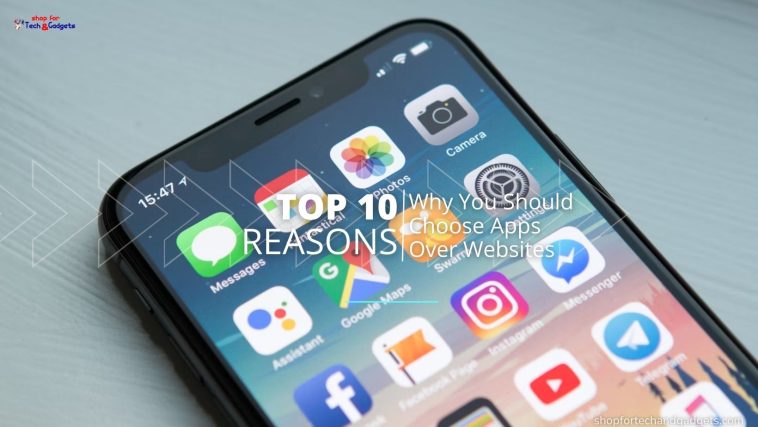The digital world is evolving rapidly, and businesses must keep up with changing user preferences. In recent years, mobile usage has skyrocketed, with more people relying on smartphones for everyday activities like shopping, socializing, and entertainment. This shift has led companies to rethink their digital strategies, with many opting for mobile apps over traditional websites.
While having both a mobile app and a website is ideal, not all businesses have the resources to maintain both platforms. This makes choosing between the two a crucial decision. If you’re still on the fence, consider this: studies show that users spend 90% of their mobile time on apps compared to just 10% on mobile websites. This preference highlights the undeniable advantages of apps in terms of user engagement, functionality, and overall experience.
10 Reasons Why Mobile Apps Outperform Websites
1. Offers Better Personalization
Personalization is key to improving user experience, and mobile apps excel in this area. Unlike websites, apps allow users to set preferences from the start, ensuring a tailored experience. By collecting data on user behavior, interests, and past interactions, apps can:
- Provide personalized content recommendations
- Display customized deals and promotions
- Adjust the interface based on user preferences
- Offer location-based suggestions (e.g., nearby restaurants, events, or discounts)
For example, streaming services like Netflix and Spotify use AI-driven algorithms to curate personalized content, making them more engaging than their web-based counterparts.
Why It Matters in 2025:
With advancements in AI and machine learning, apps are becoming even more intelligent in predicting user needs. A personalized app experience leads to higher customer retention and engagement, making it a must-have for businesses.
2. Easier and More Effective Notifications
Notifications are one of the most powerful tools for user engagement, and mobile apps have a huge advantage over websites in this area. While websites can send emails or browser notifications, apps can deliver push notifications, which:
✅ Appear instantly on the user’s home screen
✅ Are non-intrusive yet highly visible
✅ Encourage immediate action (e.g., discounts, updates, or reminders)
Push notifications boast an open rate of 90%, compared to email marketing’s 20% open rate. This makes them a highly effective marketing tool for businesses.
Why It Matters in 2025:
With more businesses fighting for consumer attention, well-crafted push notifications can significantly boost customer engagement, retention, and conversions.
3. Takes Full Advantage of Mobile Device Features
One of the biggest limitations of websites is their reliance on browsers, restricting them from using a smartphone’s full capabilities. Mobile apps, on the other hand, can seamlessly integrate with:
📷 Camera – for scanning QR codes, uploading images, or video chatting
📍 GPS – for location-based services like ride-sharing and food delivery
📞 Phone & Contacts – for direct calling, contact syncing, or easy sharing
🎤 Microphone & Sensors – for voice search, hands-free commands, or fitness tracking
Apps like Uber and Google Maps wouldn’t be as efficient without leveraging these mobile features.
Why It Matters in 2025:
With 5G technology improving app responsiveness and wearable devices becoming more common, apps will continue to leverage mobile hardware for better functionality.
4. Works Offline
Unlike websites that require an active internet connection, many mobile apps offer offline functionality. While they may need internet access for some features, apps can still store essential content, allowing users to:
📚 Read saved articles (e.g., Pocket, Kindle)
🎮 Play offline games (e.g., Subway Surfers, Candy Crush)
📝 Use offline productivity tools (e.g., Evernote, Google Docs offline mode)
This ability makes apps more reliable and accessible, especially for users in areas with poor or limited connectivity.
Why It Matters in 2025:
With growing concerns over data costs and network reliability, businesses that offer offline functionality in their apps will have a significant competitive edge.
5. Faster Performance Compared to Websites
Speed is everything in today’s digital world. Studies show that users abandon websites that take longer than 3 seconds to load. Apps, however, are inherently faster because:
✅ They store data locally rather than relying on web servers
✅ They use optimized frameworks designed for mobile performance
✅ They can preload essential content for instant access
For instance, e-commerce apps like Amazon load product pages significantly faster than their website counterparts, leading to better user retention and increased sales.
Why It Matters in 2025:
As mobile expectations rise, businesses cannot afford slow-loading websites. Apps deliver superior speed, ensuring a smooth and efficient user experience.
6. Enhanced Security Features
Security is a growing concern for online users, and mobile apps offer more advanced security measures than websites. They can incorporate:
🔐 Biometric authentication (Face ID, fingerprint scanning)
🛡 Encrypted data storage
📲 Two-factor authentication (2FA)
📍 Geofencing & device-specific login restrictions
These security features provide an extra layer of protection, reducing fraud risks and making apps a safer choice for sensitive transactions, such as banking and online shopping.
Why It Matters in 2025:
With cyber threats increasing, users demand more security. Apps with built-in biometric authentication and encryption are far more secure than websites.
7. Superior User Experience and Intuitive Navigation
Mobile apps offer a smoother, more intuitive user experience compared to websites, thanks to:
- Gestures like swipe, pinch, and tap for easier navigation
- Minimal loading times for a seamless experience
- More immersive interfaces designed specifically for mobile
Apps are designed with mobile users in mind, making them easier to use and more engaging than mobile websites, which often struggle with responsive design limitations.
Why It Matters in 2025:
With UI/UX trends focusing on gesture-based navigation and minimalistic designs, apps will continue to offer the best user experience.
8. Increased Brand Engagement and Customer Loyalty
Apps create a stronger connection between businesses and customers. Unlike websites, which users can visit once and forget, apps remain on the user’s phone, increasing visibility.
- Users are more likely to return to an app than a website
- Apps can integrate loyalty programs and reward points
- Businesses can build a direct relationship with customers through personalized experiences
Why It Matters in 2025:
With competition growing, customer retention is more valuable than ever. Apps provide tools to keep users engaged and loyal.
9. Higher Conversion Rates Compared to Websites
Apps are proven to convert better than websites because they:
✔ Provide a faster, more optimized checkout experience
✔ Offer one-click payments and autofill features
✔ Enable personalized offers and promotions
According to statistics, e-commerce apps have a conversion rate of 3x higher than mobile websites.
Why It Matters in 2025:
For businesses looking to boost sales and engagement, apps offer a far superior conversion rate compared to websites.
10. Competitive Advantage in the Digital Age
Finally, having a mobile app sets businesses apart from competitors who rely solely on websites. It enhances credibility, improves accessibility, and provides a cutting-edge experience.
Why It Matters in 2025:
With AI-driven automation, AR/VR integration, and mobile commerce booming, having a mobile app is no longer optional—it’s a necessity.
Final Thoughts
Mobile apps offer unmatched benefits over websites in speed, security, engagement, and conversion rates. As mobile technology continues to evolve, businesses that invest in mobile apps will stay ahead of the competition and create a seamless, engaging experience for their users.
So, if you’re looking to grow your business in 2025, an app is the way to go! 🚀




